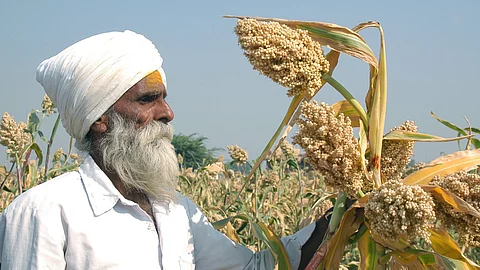
- HOMEGROWN WORLD
- #HGCREATORS
- #HGEXPLORE
- #HGVOICES
- #HGSHOP
- CAREERS
- ABOUT US
- CONTACT US

Have you ever been to a Hurda party?
A staple grain in many parts of rural Maharashtra and Gujarat, 'Hurda' or 'Ponkh' is the tender jowar or sorghum sown in the rabi or post-monsoon season and harvested in winter between November and February. Celebrated in sorghum farms in parts of rural Maharashtra, Hurda Parties are the modern iteration of an ancient ritual that marks the beginning of this harvest season. A time-honoured tradition woven into the social fabric of rural Maharashtra, this pastoral festival has recently made a comeback across farms and resorts surrounding Pune, Solapur, Nashik, and Aurangabad.
Hurda or sorghum (Sorghum bicolor) is the name of a cereal grain plant of the grass family and its edible starchy seeds. Although sorghum likely originated in Africa — where it remains a major food crop — the plant is now widely cultivated in tropical and subtropical regions across the world. India, with an annual production of 4.8 million tonnes, is the second largest producer of sorghum in the world; and Maharashtra and Karnataka account for 57.2% of all sorghum produced in India today. In its mature form, millets are difficult to eat. So they are often milled into flour and used to make flatbreads like roti, chapati, and bhakri.
Unlike other millets, however, tender Hurda is perfectly edible as it is. It has a mellow sweetness which makes it the perfect ingredient for savoury-sweet chats and salads, or the spicy chutneys it is usually served with.
The harvesting of tender Hurda cobs is the centrepiece of the Hurda harvest festival. The event typically takes place on early mornings in winter between November and February when the freshly harvested crop is ready for consumption. At Hurda parties, usually held at millet farms, the tender Hurda cobs are harvested, cleaned, and slow roasted on a bonfire made of coal, cow dung cakes, or firewood for 5 to 7 minutes. The hot cobs are then covered in cloth and threshed to separate the chaff from the grains.
The freshly roasted grains are then mixed with other fruits and vegetables to make savoury chats, or served with jaggery or spicy chutneys made with peanuts, chilli, garlic, and chopped onions. Other foods, like millet flour flatbreads and spicy meat curries are also served at these Hurda parties.
Although Hurda parties may appear to be a relatively new phenomenon, the truth is that these events trace their origin to the ancient Indian tradition of harvest festivals. Though records are scarce due to the rural, undocumented nature of such traditions, food historians believe that these traditions go back centuries, if not millennia into India's history.
In the old days, farmers would often spend entire days and nights to guard their valuable crops from pests and pillagers. To kill time and entertain themselves, they may have started bonfires and roasted some tender millet cobs to eat, only to realise how delicious they are. It is very likely that harvest festivals like Hurda parties started from traditions like this.
Today, they are one of the best ways to usher in winter in Maharashtra.
If you enjoyed reading this, here's more from Homegrown:
Get Your Hands Dirty & Learn The Ways Of Nature At 5 Organic Farm Stays Across IndiaThe Forgotten Heritage & Legacy Of South Kolkata’s Art Deco Neighbourhoods
Inside A Photo Series Capturing The Grim Realities Of Rural Punjab's Farming Community
An Artisanal Farm-to-Fork Experience In South Goa Is Reimagining Classic Goan Cuisine
